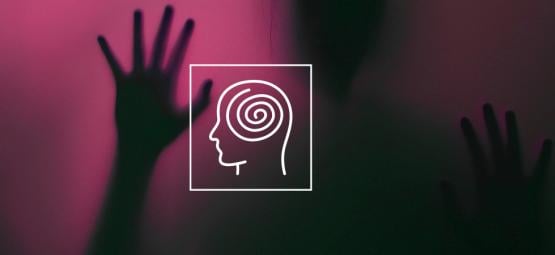A Definitive Guide To The Cognitive Effects Of Psychedelics
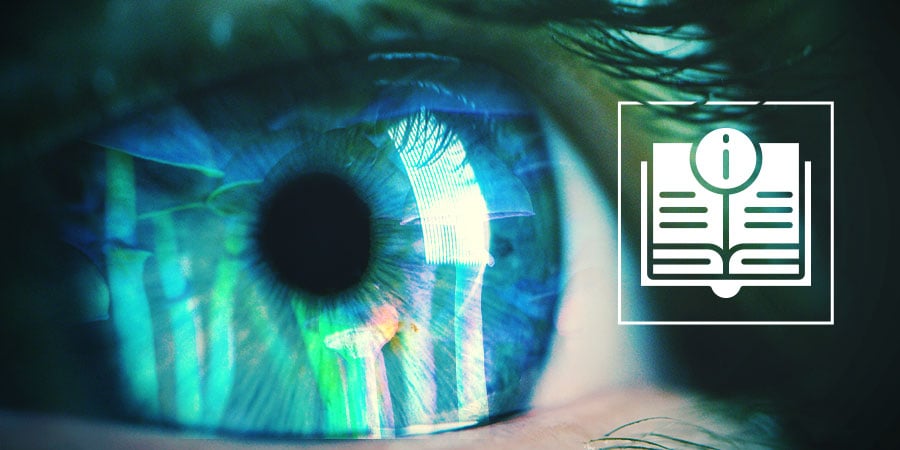
Many people know that psychedelics can influence how we think and feel. Below, we break down the different cognitive effects of psychedelics, and explore various enhancements and suppressions in more detail.
Psychedelic substances can bring on a variety of effects, from hallucinations and visual alterations to a perceived enhancement of our senses, feelings, and emotions. Among the many facets of “tripping” are cognitive effects. This is where the psychedelic alters or introduces new content to a person's cognition, the process of how we acquire knowledge and understanding.
Why is it useful to understand what is happening when taking psychedelics? Aside from exploring their scientific implications on the brain, it also has a practical advantage for the psychonaut: A prepared trip, where you know what to expect, usually also equates to a pleasant trip. So, let us take a closer look at how psychedelics affect our mind.
THE COGNITIVE EFFECTS OF PSYCHEDELICS: DIFFERENT COGNITIVE STATES

The ways psychedelics affect how we think, experience, and understand things can be grouped into different cognitive states:
- Transpersonal effects (such as spiritual enhancement, altered identity, understanding of consciousness, perception of eternity, etc.)
- Psychological effects (déjà vu, derealisation, delusions, depersonalisation, paranoia, etc.).
- Novel cognitive states like time distortion, euphoria, disorientation, thought loops, etc.
- Cognitive enhancements and cognitive suppressions
Cognitive enhancements and suppressions manifest in various forms, explained in further detail below:
COGNITIVE ENHANCEMENTS
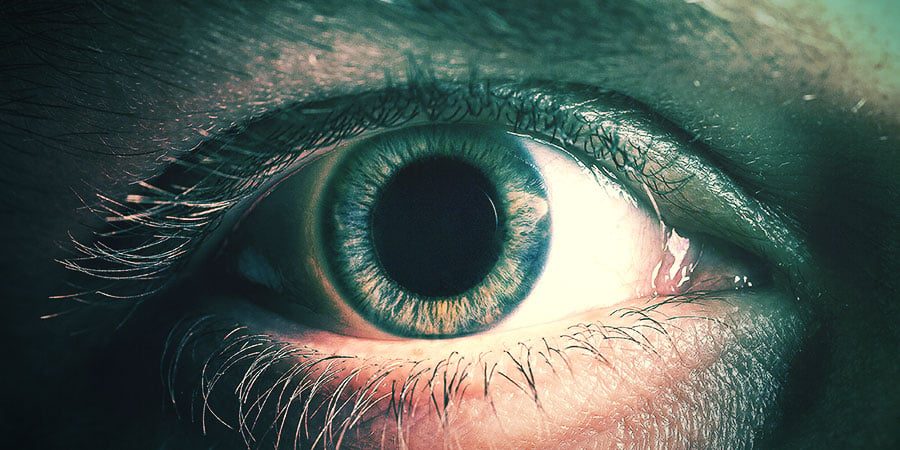
Cognitive enhancements are characterised by increased intensity of normal cognitive processes such as memory, focus, and creativity when under the influence of psychedelics.
 CREATIVITY ENHANCEMENT
CREATIVITY ENHANCEMENT
Psychedelics can enhance our creativity. They can help us imagine new ideas or think about things in novel and profound ways. This can be useful for artists, writers, and musicians when seeking some inspiration, or for anyone requiring a creative boost. It’s noteworthy to mention that the creativity-enhancing effects of psychedelics are thought to exist not only during the trip, but following the experience as well. Creativity enhancement often comes with increased motivation, better analysis, less personal bias, and accelerated thoughts.
 EMOTIONAL ENHANCEMENT
EMOTIONAL ENHANCEMENT
Psychedelics can greatly amplify a person's current emotional state. Unlike when psychedelics bring about novel emotions like euphoria or paranoia, emotional enhancements simply intensify your current “inner” state. This, of course, can go both ways: If you’re feeling positive and happy, without fear and without repressed emotions, a psychedelic trip is likely to return a positive experience.
On the other hand, these drugs can also amplify any negative feelings, rather than suppress them, increasing the chances for a negative experience—a “bad trip”. As such, it’s crucial to keep set (mindset) and setting (location and people around you) in mind before tripping.
 ENHANCED FOCUS
ENHANCED FOCUS
Psychedelics can also increase our ability to concentrate on a single subject, while ignoring others, with greater acuity. As such, this heightened focus allows us to complete monotonous or extended tasks with greater efficiency. In fact, this focus can even make you forget about eating, hydrating, and sleeping—so it’s important to keep this in mind.
Then again, depending on the psychedelic in question and the dose, this “boost” in concentration can also cause you to fixate on trivial or otherwise meaningless tasks instead of focusing on more significant issues. As mentioned in the paragraph on emotional enhancements, the focus-boosting effects of psychedelics are believed to increase motivation, mental stimulation, and accelerated thoughts in the days and weeks that follow the trip.
 WAKEFULNESS
WAKEFULNESS
Psychedelic substances can help us stay alert and awake with a decreased need for sleep. What’s noteworthy about this is that it doesn’t actually boost physical energy levels, but instead makes us subjectively feel more alert and well-rested. Normally, if someone is moderately tired before consuming a psychedelic, the drug will do away with the feeling of needing to sleep. On the other hand, psychedelics may not have this effect on those who are sleep deprived or exhausted.
 MOTIVATION ENHANCEMENT
MOTIVATION ENHANCEMENT
Psychedelics can increase our desire to be productive, to perform tasks, and to accomplish goals. Similar to focus enhancement, this means you may be able to perform tasks you’d otherwise be hesitant to do. Something that previously seemed difficult or boring can now be made more enjoyable, or can simply be completed with greater efficiency.
This effect can be attributed to a variety of related effects including wakefulness, positive mood, and the absence of anxiety and other inhibiting factors.
COGNITIVE SUPPRESSIONS

Psychedelics can also suppress our cognition. Here are some of the cognitive suppressions likely to occur under the influence of hallucinogenic substances:
 CONFUSION
CONFUSION
Confusion is the inability to think with clarity and coherence, a state where one may be unable to grasp or comprehend concepts and situations that would otherwise be perfectly understandable when sober. Potential confusion as a result of consuming a psychedelic substance may be further exacerbated if someone is not familiar with a particular drug or the setting it is being consumed in.
As with other cognitive effects, confusion can be accompanied by other related effects; for example, delusion, delirium, and memory suppression, which can further amplify the confusion and lack of comprehension.
 LANGUAGE SUPPRESSION
LANGUAGE SUPPRESSION
Among the potential effects of psychedelics is aphasia, which is the decreased understanding—or complete lack of use—of speech. This means that somebody who has consumed a psychedelic may temporarily lose their ability to vocalise their thoughts or understand what others are saying. These two effects don’t necessarily occur at the same time, though. It can happen that someone finds themselves unable to vocalise, yet can understand others just fine, or vice versa.
The language-suppressing effect of psychedelics can also differ in severity depending on dose and the psychedelic in question. At lower doses, symptoms tend to be mild and intermittent. Then there are forms where someone may know what they want to say, but are unable to do so. In some cases, almost all language function—including language comprehension and expression—can be temporarily lost while under the influence of a psychedelic. Language suppression often comes with other effects such as delayed thinking and/or suppression of analytic abilities.
 PERSONAL BIAS SUPPRESSION
PERSONAL BIAS SUPPRESSION
Psychedelics can bring on personal bias suppression, which is a decrease or temporary absence of personal or cultural preferences, biases, or filters. Those seeking new insights can take advantage of personal bias suppression as it allows psychonauts to realise that their established thoughts and views, and possibly even their entire personality, are not due to an objective truth, but merely the result of subjective opinions. When these filters finally come off during a psychedelic experience, this can lead to new insights and views that remain long after the experience.
Personal bias suppression can also appear alongside cognitive enhancements in an ability to focus, and other suppressions like memory and language suppression.
 MEMORY SUPPRESSION
MEMORY SUPPRESSION
Psychedelic substances can inhibit a person’s ability to maintain a functional short-term and long-term memory. Memory suppression is often dose-dependent and can occur in various intensities. A low dose of certain psychedelics—including LSD or magic mushrooms—may only cause partial short-term memory suppression. With higher doses, this effect can progress to a complete suppression of short-term and long-term memory. One may become temporarily incapable of remembering specific details regarding the present situation and the events leading up to it. This is often amplified by other effects such as confusion, disorientation, thought loops, or a complete loss of control.
Should complete long-term memory suppression occur (which is usually also accompanied by a failure of short-term memory), the person may be entirely incapable of remembering even the most fundamental concepts, such as their name. They may lose the ability to understand anything at all, including the concepts of time and existence. All mental associations may vanish, including meanings and preferences related to the external world.
 EGO DEATH
EGO DEATH
Ego death, the highest level of memory suppression, is the loss of all ability to comprehend information associated with one's sense of self and identity. It is the profound experience of the complete absence (“death”) of the ego, where one no longer feels like an observer of the world, but rather an intrinsic part of the universe.
Perhaps somewhat misleading, ego death doesn’t mean that all mental processes will cease. Rather, as it’s sometimes reported by those who’ve experienced it, it removes the otherwise ever-present feeling of “being the thinker”. As such, sensory input can be processed in its pure form from a more neutral perspective untainted by bias, memories, and experiences. Ego death is often accompanied by other effects such as feelings of unity and spiritual enhancement.
WHAT HAPPENS TO OUR BRAIN WHEN WE TAKE PSYCHEDELICS?
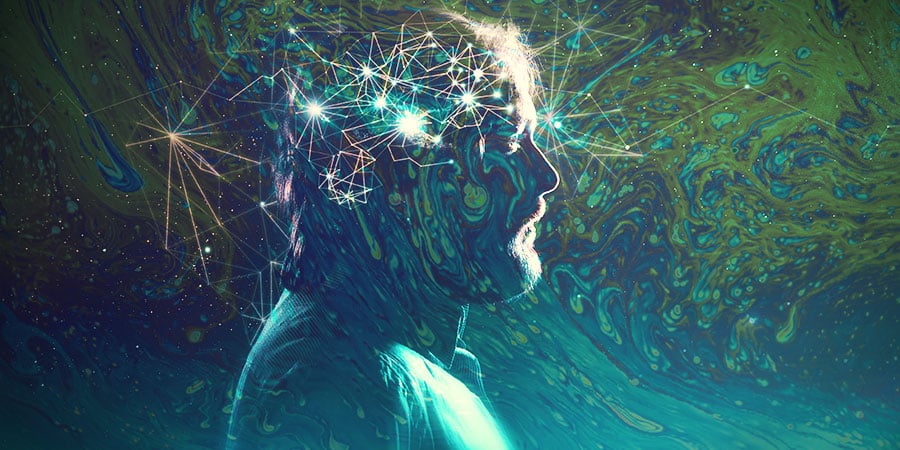
What exactly happens to the brain on psychedelic drugs? Classic hallucinogenic substances such as DMT, LSD, or magic mushrooms (so-called serotonergic hallucinogens) are thought to produce their perception-altering effects through interactions with serotonin (5-HT) receptors in the brain. Serotonin has an image as a contributor to feelings of well-being and happiness, though its actual biological function is multifaceted, and is thought to encompass cognition, reward, learning, memory, and many other physiological processes.
Most of the cognitive effects of psychedelics occur in the prefrontal cortex, which is the part of the brain involved in mood, perception, and cognition, but can also affect other regions in the brain, for example those regulating arousal and stress.
A study published in 2012 suggests that one psychedelic compound, N,N-dimethyltryptamine (DMT), occurs naturally in the human brain. This led researchers to speculate that endogenous DMT may be involved in the unique states that occur during near-death or mystical experiences.
A recent study conducted on nerve cells and on animals suggests that psychedelics promote structural and functional neural plasticity, which is the ability of the brain to change and adapt in response to changes. If these findings hold true for humans, this could open up great potential for using psychedelic substances to treat certain mood disorders like anxiety or depression.
According to the researchers, psychedelics may be used to repair compromised areas in the brain. The study, published in 2018, found that psychedelics can increase the number of branches and dendritic spines on neurons, as well as the number of synapses, the connections between neurons.
EVERYONE’S PSYCHEDELIC EXPERIENCE IS DIFFERENT
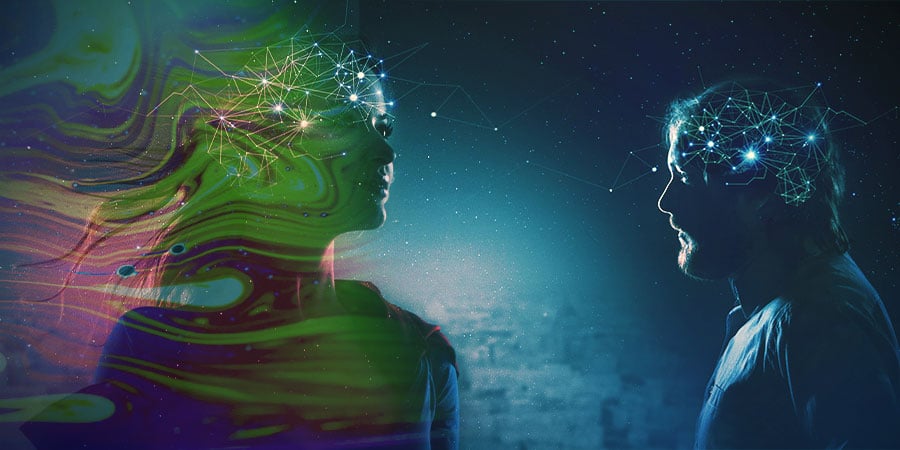
As we conclude our guide on (some of) the cognitive effects of psychedelics, we do not want to finish without stating something important: Although there are commonalities between psychedelic experiences, everyone’s reaction can be different. The best advice is to start with a low dose, observe the effects, then build up the strength of the psychedelic until you reach a level that you’re happy with. Going for so-called “hero” doses right away won’t have any benefits, and may even be detrimental to experiencing a psychedelic in its best light.
- (n.d.). - https://www.researchgate.net
- Calvin Ly, Alexandra C. Greb, Lindsay P. Cameron, Jonathan M. Wong, Eden V. Barragan, Paige C. Wilson, Kyle F. Burbach, Sina Soltanzadeh Zarandi, Alexander Sood, Michael R. Paddy, Whitney C. Duim, Megan Y. Dennis, A. Kimberley McAllister, & Kassandra M. Ori-. (2018/06/12). DEFINE_ME - https://www.cell.com
- Nichols DE. (2004 Feb). Hallucinogens. - PubMed - NCBI - https://www.ncbi.nlm.nih.gov
- Strassman RJ. (1996). Human psychopharmacology of N,N-dimethyltryptamine. - PubMed - NCBI - https://www.ncbi.nlm.nih.gov
You might also like









 United States
United States

